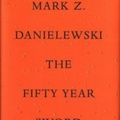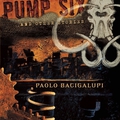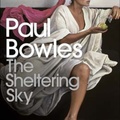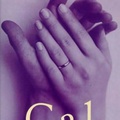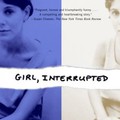Louise Welsh: The Cutting Room

I love to read books I know nothing about, and this was one such book. I noticed it in the book store while I was helping my friend find a gift for her boyfriend, and I liked its title, its cover and the fact that according to the blurb the protagonist was called Rilke so much that I wanted to read it immediately. I don’t want to be mystical – I don’t claim that books mysteriously call out to me. They do not. But sometimes a cover, a title or a name starts off a chain of associations in my mind or reminds me of certain events in such a way that I get irrepressibly curious and I want to know the book in question at once.
The Cutting Room is set in Glasgow, and the main character is the already mentioned Rilke. In spite of his poet-name, Rilke isn’t a dreamy, poetic, sophisticated character, rather, he is a cynical and cunning man. He works for an auction house as an auctioneer and the manager of collections, besides, he smokes and drinks a lot and likes to go for night walks to the park where he engages in quick sex with other loitering men. At first sight he is a bitter man with a heart made of stone, but it soon turns out that he is softer than he seems. One day he comes across an envelope full of pornographic photos while working on a collection. Most of the photos are typical pornographic shots, however, there are a couple of snuff photos, including some depicting a girl with her throat cut.
Rilke is very much disturbed by the pictures, therefore he starts out on a meaningless quest: he tries to find out whether the photos are real or staged because even though the pictures seem to have been taken at least 50 years ago, therefore the chances to uncover anything about them are slim, Rilke simply cannot get them out of his head. In order to find out something definite, he puts himself into danger, neglects his duties and gets entangled in a web of lies – and in the meantime he digs deeper and deeper into the Glasgow underworld where – despite all his previous criminal experiences – he seems like a naive young boy and where he has to face such facts which wear out even his not-too-sensitive soul.
The Cutting Room is supposed to be a crime novel/thriller, however, the investigation itself is not too interesting and the solution is not as elegant as, say, that of an Agatha Christie novel. In fact, I wouldn’t even call Rilke’s actions an „investigation” – I’d rather say it’s a manic quest in which it is painfully obvious from the very beginning that even if he gets the answer to his question, it won’t be satisfactory or won’t mean anything at all. All this is not a problem, by the way, all I’m saying is that you’d better not read this novel as a crime story because it’s not too good as such, but as a „literary” novel, it is excellent.
For instance, the way Welsh depicts how Rilke’s obsession keeps growing and how he loses touch with his ordinary reality is brilliant. The time frame of the story (minus the epilogue) is only a couple of weeks, but these few weeks are more than enough for Rilke to become dangerously disoriented and to begin to question how real reality is and what is behind that. The theme of the pornographic photos is also related to Rilke’s re-interpretation of reality: according to the official standpoint, „real” snuff porn doesn’t exist, and pictures sold as snuff all show staged scenes – however, there’s no way of knowing for sure if this is true or not. The reality Rilke encounters is unknowable, and frightening – and Welsh shows this scary quality very effectively.
Besides this, the settings and the atmosphere of the novel are also unique – it’s been a long time since I read any book as dark, bizarre and oppressing as The Cutting Room. The dingy, shady flat of Rilke’s boss, Rose, full of feminine secrets; the gay bar where transgender men can truly become women once a month; the obscure book shop which hides a cellar labyrinth underneath; or the pokey home of Rilke’s old friend, the drug dealer Leslie – in all these places people are not what they seem: the clientele of the gay bar consists of women who are in fact men, Leslie, the tough drug dealer turns out to be not-so-tough, and so on. And the way reality and illusion, true and fake mingle in the novel, and Rilke’s futile quest to learn the truth make this novel truly uncanny (and therefore truly exciting for me).
The Cutting Room is set in Glasgow, and the main character is the already mentioned Rilke. In spite of his poet-name, Rilke isn’t a dreamy, poetic, sophisticated character, rather, he is a cynical and cunning man. He works for an auction house as an auctioneer and the manager of collections, besides, he smokes and drinks a lot and likes to go for night walks to the park where he engages in quick sex with other loitering men. At first sight he is a bitter man with a heart made of stone, but it soon turns out that he is softer than he seems. One day he comes across an envelope full of pornographic photos while working on a collection. Most of the photos are typical pornographic shots, however, there are a couple of snuff photos, including some depicting a girl with her throat cut.
Rilke is very much disturbed by the pictures, therefore he starts out on a meaningless quest: he tries to find out whether the photos are real or staged because even though the pictures seem to have been taken at least 50 years ago, therefore the chances to uncover anything about them are slim, Rilke simply cannot get them out of his head. In order to find out something definite, he puts himself into danger, neglects his duties and gets entangled in a web of lies – and in the meantime he digs deeper and deeper into the Glasgow underworld where – despite all his previous criminal experiences – he seems like a naive young boy and where he has to face such facts which wear out even his not-too-sensitive soul.
The Cutting Room is supposed to be a crime novel/thriller, however, the investigation itself is not too interesting and the solution is not as elegant as, say, that of an Agatha Christie novel. In fact, I wouldn’t even call Rilke’s actions an „investigation” – I’d rather say it’s a manic quest in which it is painfully obvious from the very beginning that even if he gets the answer to his question, it won’t be satisfactory or won’t mean anything at all. All this is not a problem, by the way, all I’m saying is that you’d better not read this novel as a crime story because it’s not too good as such, but as a „literary” novel, it is excellent.
For instance, the way Welsh depicts how Rilke’s obsession keeps growing and how he loses touch with his ordinary reality is brilliant. The time frame of the story (minus the epilogue) is only a couple of weeks, but these few weeks are more than enough for Rilke to become dangerously disoriented and to begin to question how real reality is and what is behind that. The theme of the pornographic photos is also related to Rilke’s re-interpretation of reality: according to the official standpoint, „real” snuff porn doesn’t exist, and pictures sold as snuff all show staged scenes – however, there’s no way of knowing for sure if this is true or not. The reality Rilke encounters is unknowable, and frightening – and Welsh shows this scary quality very effectively.
Besides this, the settings and the atmosphere of the novel are also unique – it’s been a long time since I read any book as dark, bizarre and oppressing as The Cutting Room. The dingy, shady flat of Rilke’s boss, Rose, full of feminine secrets; the gay bar where transgender men can truly become women once a month; the obscure book shop which hides a cellar labyrinth underneath; or the pokey home of Rilke’s old friend, the drug dealer Leslie – in all these places people are not what they seem: the clientele of the gay bar consists of women who are in fact men, Leslie, the tough drug dealer turns out to be not-so-tough, and so on. And the way reality and illusion, true and fake mingle in the novel, and Rilke’s futile quest to learn the truth make this novel truly uncanny (and therefore truly exciting for me).

